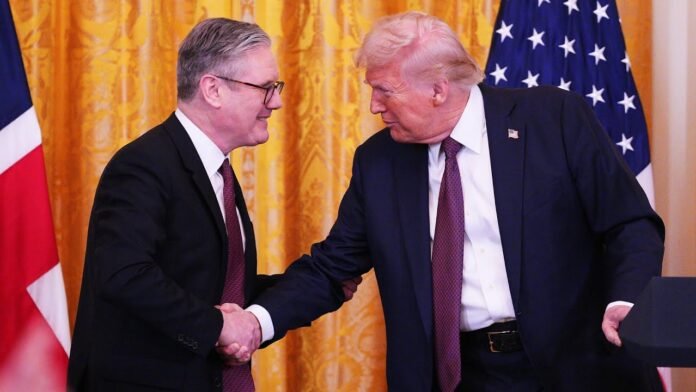The UK avoids a sudden doubling of US steel and aluminium tariffs thanks to a pending trade pact, but uncertainty looms over long-term tariff relief.
The UK has been temporarily spared from US President Donald Trump’s recent executive order doubling steel and aluminium tariffs from 25% to 50%. The new order, signed on Tuesday evening, raises import taxes for US companies buying steel and aluminium from many countries starting Wednesday, but the UK’s tariff rate remains at 25% — a temporary carve-out linked to the US-UK Economic Prosperity Deal (EPD) signed in May.
Trump’s executive order relies on the trade agreement reached between the UK and US in early May 2025, which promises to reduce or remove tariffs on key metals. However, the deal has not yet been implemented in either country’s legislation, meaning UK exporters still face the risk of tariffs until it comes into force. If the deal falters, the UK could face the 50% tariff increase from July 9, 2025, when Trump warned he might raise levies unless the UK complies with relevant aspects of the EPD.
The UK government reiterated its commitment to protecting British businesses and jobs. A spokesperson said officials will continue working with US counterparts to implement the agreement fully, with legislation expected to be introduced in Parliament “in due course.”
Business Secretary Jonathan Reynolds met US Trade Representative Jamieson Greer in Paris on Tuesday ahead of the executive order, reportedly securing the UK’s exemption from the immediate tariff hike.
The US is a significant market for UK steel, accounting for approximately 7% of UK steel exports. The sudden doubling of tariffs to 50% on steel and aluminium would have dealt a major blow to the sector, potentially leading to job losses and increased costs for UK producers.
Gareth Stace, director general of UK Steel, welcomed the UK’s exemption as “a welcome pause” but cautioned that uncertainty remains about the timing and final tariff rates. “US customers may hesitate to place orders with UK producers while the tariff situation remains unclear,” he said. Stace called on both governments to “urgently turn the May deal into reality to remove the tariffs completely,” warning that ongoing ambiguity harms business confidence.
Criticism came from the opposition Labour Party as well. Shadow business secretary Andrew Griffith blamed the government’s “botched negotiations,” saying they had left businesses in limbo at a critical time. “This country simply cannot afford their continuing failure,” he added.
The background to the current tariff situation dates back to February 10, when Trump announced a 25% tariff on steel and aluminium imports to the US, which came into effect in March. In April, Trump introduced a 10% baseline tariff on all goods from most countries, including the UK, further raising trade tensions.
The May agreement between the UK and US aimed to ease these tensions by agreeing to reduce or remove certain tariffs as part of the broader Economic Prosperity Deal. However, the deal’s full implementation depends on parliamentary approval and other legal steps on both sides of the Atlantic.
Until the deal is fully enacted, UK steel exporters remain vulnerable to US tariffs, creating an uncertain business climate. With Trump’s warning that the tariff could rise after July 9, UK exporters and manufacturers face ongoing risk.
The UK government’s ability to safeguard the steel industry now hinges on delivering the promised trade deal and maintaining close diplomatic cooperation with the US. Meanwhile, the steel sector and business leaders are calling for swift action to provide clarity and security to UK exporters.
As trade tensions continue globally, the temporary UK exemption highlights both the fragility and the potential for cooperation in transatlantic trade relations. The coming weeks will be crucial for the UK government to cement the deal and shield British industries from damaging tariffs.
THE GUARDIAN
The White House has announced that the UK will be spared from the newly imposed 50% US tariffs on steel and aluminium, maintaining the current 25% rate following a trade deal reached last month. President Donald Trump signed an executive order raising tariffs on other countries but granted “different treatment” to the UK due to the agreement with Washington. However, the 50% tariffs could be reinstated in July if the UK is deemed non-compliant with the deal’s terms.
A UK government spokesperson welcomed the decision, highlighting the commitment to protect British industry and jobs, especially in steel. UK Steel’s director general, Gareth Stace, expressed cautious optimism but urged for swift implementation to remove tariffs entirely.
The breakthrough deal, hailed by Prime Minister Keir Starmer and trade unions, aims to secure thousands of British jobs. Business Secretary Jonathan Reynolds recently met US trade representatives to expedite the deal’s rollout. Meanwhile, the full text of the agreement remains unreleased, with the White House urging the UK Parliament to disclose it.
THE INDEPENDENT
With hours to go before the US raises steel and aluminium tariffs from 25% to 50%, the UK government remains uncertain whether British steel will be exempted. Although a trade deal struck last month with the US promised zero tariffs, it has yet to be implemented. A Downing Street source admitted No 10 “doesn’t quite know what the announcement will be,” with timing for exemptions reportedly “in the US’s gift.”
Business Secretary Jonathan Reynolds is in Paris meeting US trade counterpart Jamieson Greer to negotiate a carve-out and push for swift deal implementation. Meanwhile, the UK government continues to urge clarity on tariff impacts amid fears that the higher rates could hit British steel exporters.
UK Steel director general Gareth Stace warned that the tariff hike is a “body blow,” risking delayed or cancelled orders. Opposition politicians criticised the Labour government’s handling of the negotiations, while the Prime Minister’s office said the UK-US agreement aims to protect key industries, with work ongoing to finalise the deal.
